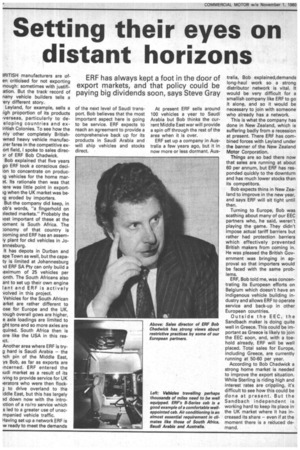Setting their eyes on distant horizons
Page 42

If you've noticed an error in this article please click here to report it so we can fix it.
iRITISH manufacturers are ofen criticised for not exporting !nough: sometimes with justifiation. But the track record of nany vehicle builders tells a .ery different story.
Leyland, for example, sells a ligh proportion of its products !verseas, particularly to deeloping countries and exlritish Colonies. To see how the nly other completely Britishwned heavy vehicle manufacirer fares in the competitive exort field, I spoke to sales direc)1. of ERF Bob Chadwick.
Bob explained that five years go ERF took a conscious deciion to concentrate on producwg vehicles for the home marat. Its rationale then was that lere was little point in exportig when the UK market was beig eroded by importers.
But-the company did keep, in ob's words, "a fingerhold on alected markets." Probably the wost important of these at the toment is South Africa. The 3onomy of that country is Doming and ERF has an assemy plant for ckd vehicles in Joannesburg.
It has depots in Durban and ape Town as well, but the capaty is limited at Johannesburg ld ERF SA Pty can only build a aximum of 25 vehicles per onth. The South Africans also ant to set up their own engine lant and ERF is actively volved in this project.
Vehicles for the South African arket are rather different to ose for Europe and the UK. lough overall gcws are higher, e axle loadings are limited to ght tons and so more axles are quired. South Africa then is ore like the USA in thisres:ct.
Another area where ERF is tryg hard is Saudi Arabia — the ich pin of the Middle East, ys Bob, as far as exports are !ncerned. ERF entered the iudi market as a result of its !ving to provide service for UK ierators who were then flock
to drive overland to the iddle East, but this has largely ad down now with the introction of a ro/ro service which s led to a greater use of unacmpanied vehicle traffic.
Having set up a network ERF is w ready to meet the demands of the next level of Saudi transport. Bob believes that the most important aspect here is going to be service. ERF expects to reach an agreement to provide a comprehensive back up for its products in Saudi Arabia and will ship vehicles and stocks direct. At present ERF sells around 100 vehicles a year to Saudi Arabia but Bob thinks the current Middle East war will provide a spin off through the rest of the area when it is over.
ERF set up a company in Australia a few years ago, but it in now more or less dormant. Aus tralia, Bob explained,demands long-haul work so a strong distributor network is vital. It would be very difficult for a smallish company like ERF to go it alone, and so it would be necessary to join with someone who already has a network.
This is what the company has done in New Zealand, which is suffering badly from a recession at present. There ERF has combined forces with Leyland under the banner of the New Zealand Motor Corporation.
Things are so bad there now that sales are running at about 60 per annum, but ERF has responded quickly to the downturn and has much lower stocks than its competitors.
Bob expects thins in New Zealand to improve in the new year, and says ERF will sit tight until then.
Turning to Europe, Bob was scathing about many of our EEC partners who, he said, weren't playing the game. They didn't impose actual tariff barriers but rather had protection barriers which effectively prevented British makers from coming in. He was pleased the British Government was bringing in approval so that importers would be faced with the same problems.
ERF, Bob told me, was concentrating its European efforts on Belgium which doesn't have an indigenous vehicle building industry and allows ERF to operate service and back-up in other European countries.
Outside the EEC, the Sandbach maker is doing quite well in Greece. This could be important as Greece is likely to join the EEC soon, and, with a toehold already, ERF will be well placed. Total sales for Europe, including Greece, are currently running at 50-60 per year.
According to Bob Chadwick a strong home market is needed to improve the export situation. While Sterling is riding high and interest rates are crippling, it's difficult to see how this could be done at present. But the Sandbach independent is working hard to keep its place in the UK market where it has increased its share — even if at the moment there is a reduced demand.




























































































